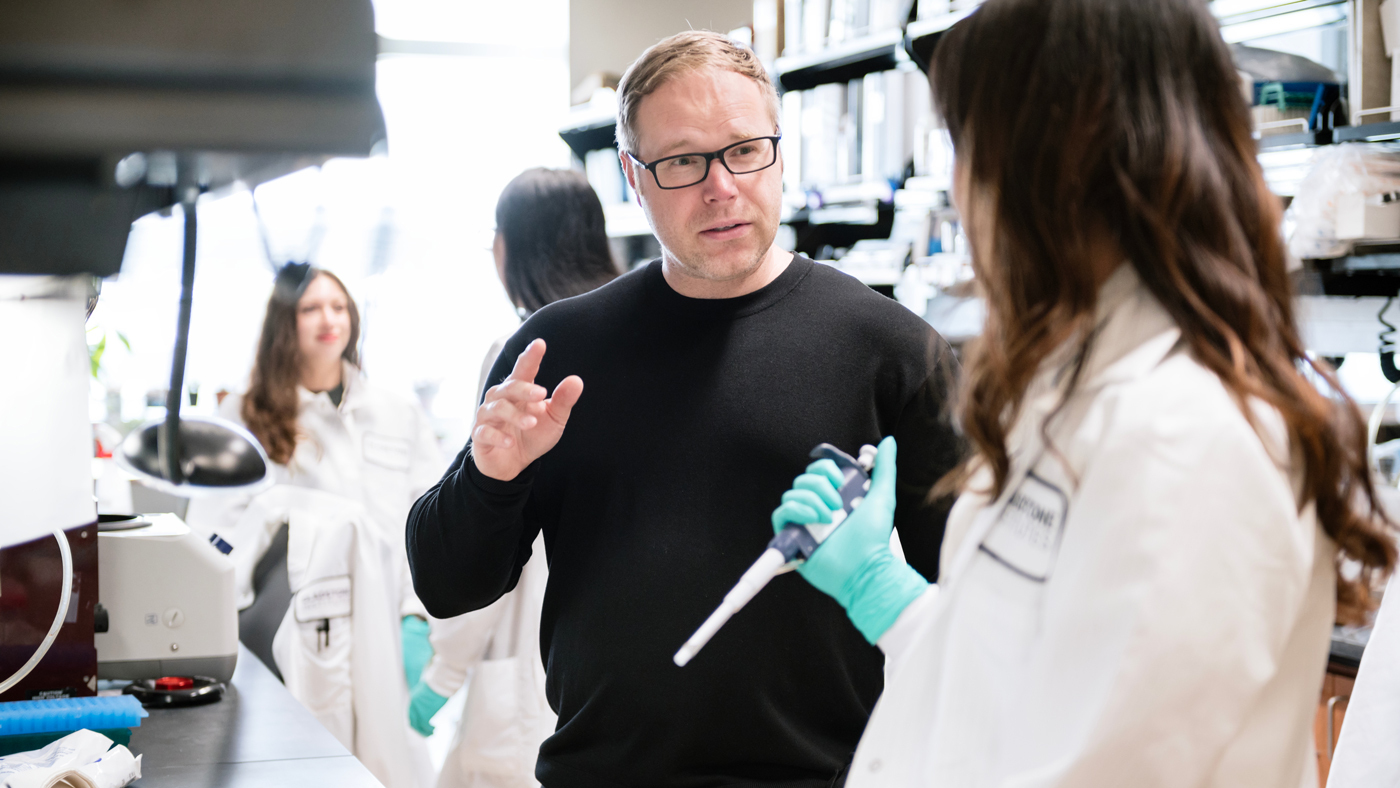Magnus Hoffmann is working to improve human health through innovative vaccine technologies and a greater understanding of the biology that influences how our immune system responds to vaccines. The Hoffmann Lab is advancing a hybrid mRNA vaccine technology that combines attributes of mRNA vaccines with elements of protein-nanoparticle vaccines to elicit more effective, longer-lasting immune protection against a wide range of disease-causing viruses, including SARS-CoV-2, HIV-1, and influenza. The lab is also designing novel nanoparticle-based drug delivery systems for small molecule- and mRNA-based medicines, and working to create “interactome” screening methodologies that will map out interactions between cell surface receptors and identify new drug targets.
Disease Areas
Areas of Expertise

Lab Focus
Research Impact
During the COVID-19 pandemic, mRNA technology emerged as an ideal platform for rapid-response vaccines due to their fast and scalable manufacturing properties. However, antibody responses elicited by mRNA vaccines were not as effective against new variants of the SARS-CoV-2 virus, and levels of protective antibodies in the body dropped significantly over time, requiring frequent and updated booster shots. This inspired Hoffmann to create more effective vaccines that elicit longer-lasting immune protection against viruses and other infectious diseases.
Hoffmann has since developed a hybrid mRNA vaccine technology that allows genetic encoding of self-assembling enveloped virus-like particles. His technology combines attributes of mRNA vaccines with elements of protein-nanoparticle vaccines for improved immune activation. The hybrid mRNA vaccine approach is based on the EABR nanoparticle technology, which induces the self-assembly and budding of enveloped virus-like particles through recruitment of cellular ESCRT proteins to the cytoplasmic domain of cell surface proteins such as viral glycoproteins.
Hoffmann has used this hybrid platform to design vaccines that induce potent and lasting immune responses against SARS-CoV-2, and his group will apply this technology to develop effective vaccines against influenza, HIV, and other pathogens. Hoffmann is also pursuing innovative vaccine strategies that target molecular elements shared by most viral variants, which will enable the development of pan-coronavirus and pan-influenza vaccines. Ongoing research in the Hoffmann lab focuses on the continued optimization, evaluation, and application of his hybrid vaccine technology, as well as research to advance nanoparticle-mediated drug delivery for a wide range of therapeutics. The lab also studies the “interactome” by mapping interactions between cell surface receptors and their ligands, which can open the door to new understandings of disease and novel therapeutic approaches.
Professional Titles
Assistant Investigator, Gladstone Institutes
Assistant Professor, Department of Microbiology and Immunology, UC San Francisco
Bio
Magnus Hoffmann, PhD, joined Gladstone Institutes in 2024 as an assistant investigator with the Gladstone Infectious Disease Institute and the Gladstone Institute of Data Science and Biotechnology. Through his research, he seeks to advance a new generation of more effective vaccines, improved drug delivery methods, and a greater overall understanding of vaccine-induced immune responses.
Hoffmann holds a doctoral degree in biology from the California Institute of Technology (Caltech), where his thesis on nanoparticle technologies was deemed the best across all disciplines and garnered the Milton and Francis Clauser Doctoral Prize for “extraordinary standards of quality, innovative research, and the potential of opening new avenues of human thought and endeavor.”
In acknowledgment of Hoffmann’s vision and record of scientific innovation, he received a prestigious NIH Director’s Early Independence Award in 2022. The award enabled him to skip traditional postdoctoral training and move immediately into an independent research position at Caltech.
Prior to joining Gladstone, Hoffmann served as the inaugural Merkin Institute Fellow at Caltech’s Merkin Institute for Translational Research. His lab continued the work he began earlier in his academic career on the development of a new hybrid vaccine technology that promises to lead to more effective and durable vaccines for a number of diseases.
"Our goal is to contribute to the development of the next generation of vaccines and medicines that can prevent and cure disease."
Honors and Awards
2022 NIH Director's Early Independence Award
2022 Merkin Institute Fellow, California Institute of Technology
2022 Milton and Francis Clauser Prize
2022 Lawrence L. and Audrey W. Ferguson Prize
Publications
Hoffmann Mag et al. (2025) Bivalent mRNA booster encoding virus-like particles elicits potent polyclass RBD antibodies in pre-vaccinated mice. bioRxiv [Preprint], 2025.08.18.670983.
Hoffmann Mag et al. (2023) ESCRT recruitment to SARS-CoV-2 spike induces virus-like particles that improve mRNA vaccines. Cell, 186:2380-2391.
Hoffmann Mag et al. (2021) In vitro characterization of engineered red blood cells as potent viral traps against HIV-1 and SARS-CoV-2. Molecular Therapy Methods & Clinical Development, 21:161-170.
Hoffmann Mag et al. (2020) Nanoparticles presenting clusters of CD4 expose a universal vulnerability of HIV-1 by mimicking target cells. Proceedings of the National Academy of Science, 117:18719-18728.
Contact
Magnus Hoffmann
Email
415.734.2739
Lilly Miranda
Administrative Associate
415.734.4857
Email

